
STANFORD UNIVERSITY PUBLICATIONS UNIVERSITY SERIES HISTORY,ECONOMICS,AND POLITICAL SCIENCE VOLUME III NUMBER 1 The Reform Movement in China r898-9r2 By MERIBETH E.CAMERON,PH.D. . 、 民至義 部 中央麻究院 STANFORD UNIVERSITY PRESS STANFORD UNIVERSITY,CALIFORNIA LONDON:HUMPHREY MILFORD OXFORD UNIVERSITY PRESS 1931 中研院人社中心园需配 000410 MMA 30560400110430
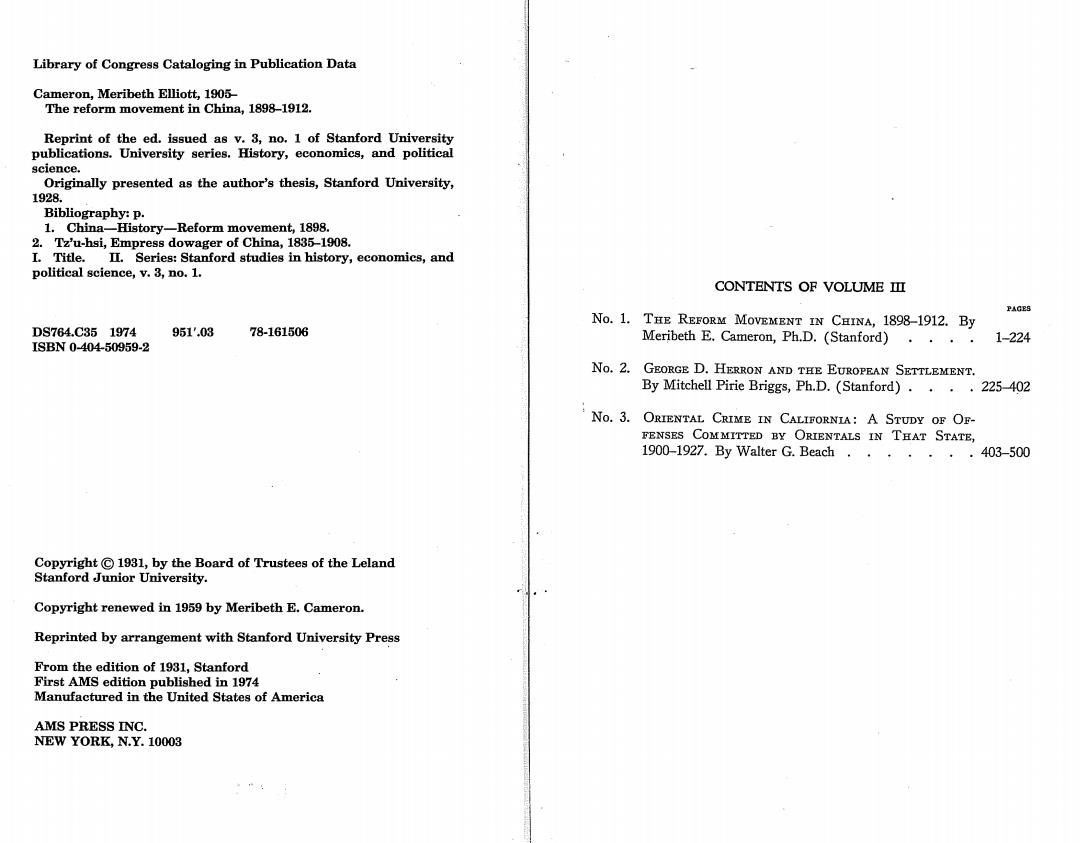
Library of Congress Cataloging in Publication Data Cameron,Meribeth Elliott,1905- The reform movement in China,1898-1912. Reprint of the ed.issued as v.3,no.I of Stanford University publications.University series.History,economics,and political science. Originally presented as the author's thesis,Stanford University, 1928. Bibliography:p. 1.China-History-Reform movement,1898. 2.Tz'u-hsi,Empress dowager of China,1835-1908. I.Title.II.Series:Stanford studies in history,economics,and political science,v.3,no.1. CONTENTS OF VOLUME DⅢ PAGES No.1.THE REFORM MOVEMENT IN CHINA,1898-1912.By DS764.C351974 951'.03 78-161506 Meribeth E.Cameron,PhD.(Stanford)···· 1-224 ISBN0-40450959-2 No.2.GEORGE D.HERRON AND THE EUROPEAN SETTLEMENT. By Mitchell Pirie Briggs,Ph.D.(Stanford).... 225-402 No.3.ORIENTAL CRIME IN CALIFORNIA:A STUDY OF OF- FENSES COMMITTED BY ORIENTALS IN THAT STATE, 1900-1927.By Walter G.Beach··,·..·403-500 Copyright C1931,by the Board of Trustees of the Leland Stanford Junior University. Copyright renewed in 1959 by Meribeth E.Cameron. Reprinted by arrangement with Stanford University Press From the edition of 1931,Stanford First AMS edition published in 1974 Manufactured in the United States of America AMS PRESS INC. NEW YORK,N.Y.10003
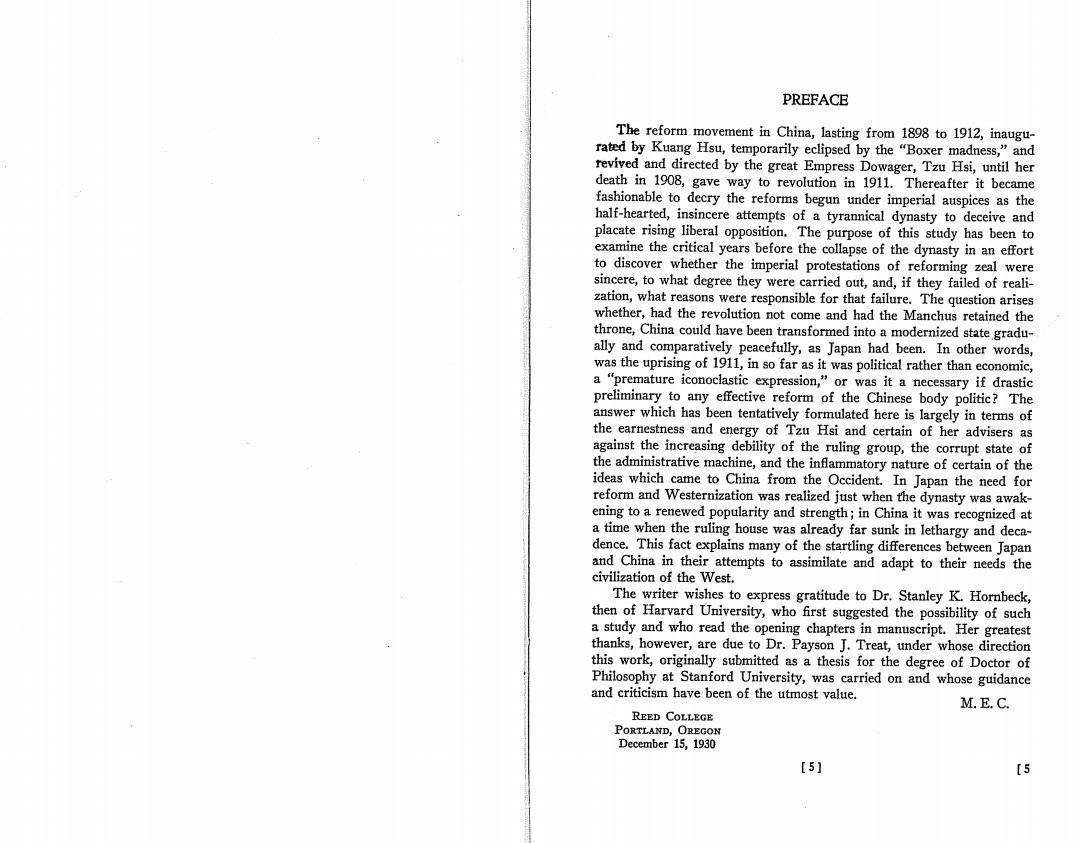
PREFACE The reform movement in China,lasting from 1898 to 1912,inaugu- rated by Kuang Hsu,temporarily eclipsed by the "Boxer madness,"and revived and directed by the great Empress Dowager,Tzu Hsi,until her death in 1908,gave way to revolution in 1911.Thereafter it became fashionable to decry the reforms begun under imperial auspices as the half-hearted,insincere attempts of a tyrannical dynasty to deceive and placate rising liberal opposition.The purpose of this study has been to examine the critical years before the collapse of the dynasty in an effort to discover whether the imperial protestations of reforming zeal were sincere,to what degree they were carried out,and,if they failed of reali- zation,what reasons were responsible for that failure.The question arises whether,had the revolution not come and had the Manchus retained the throne,China could have been transformed into a modernized state gradu- ally and comparatively peacefully,as Japan had been.In other words, was the uprising of 1911,in so far as it was political rather than economic, a "premature iconoclastic expression,"or was it a necessary if drastic preliminary to any effective reform of the Chinese body politic?The answer which has been tentatively formulated here is largely in terms of the earnestness and energy of Tzu Hsi and certain of her advisers as against the increasing debility of the ruling group,the corrupt state of the administrative machine,and the inflammatory nature of certain of the ideas which came to China from the Occident.In Japan the need for reform and Westernization was realized just when the dynasty was awak- ening to a renewed popularity and strength;in China it was recognized at a time when the ruling house was already far sunk in lethargy and deca- dence.This fact explains many of the startling differences between Japan and China in their attempts to assimilate and adapt to their needs the civilization of the West. The writer wishes to express gratitude to Dr.Stanley K.Hornbeck, then of Harvard University,who first suggested the possibility of such a study and who read the opening chapters in manuscript.Her greatest thanks,however,are due to Dr.Payson J.Treat,under whose direction this work,originally submitted as a thesis for the degree of Doctor of Philosophy at Stanford University,was carried on and whose guidance and criticism have been of the utmost value. M.E.C. REED COLLEGE PORTLAND,OREGON December 15,1930 [5] [5
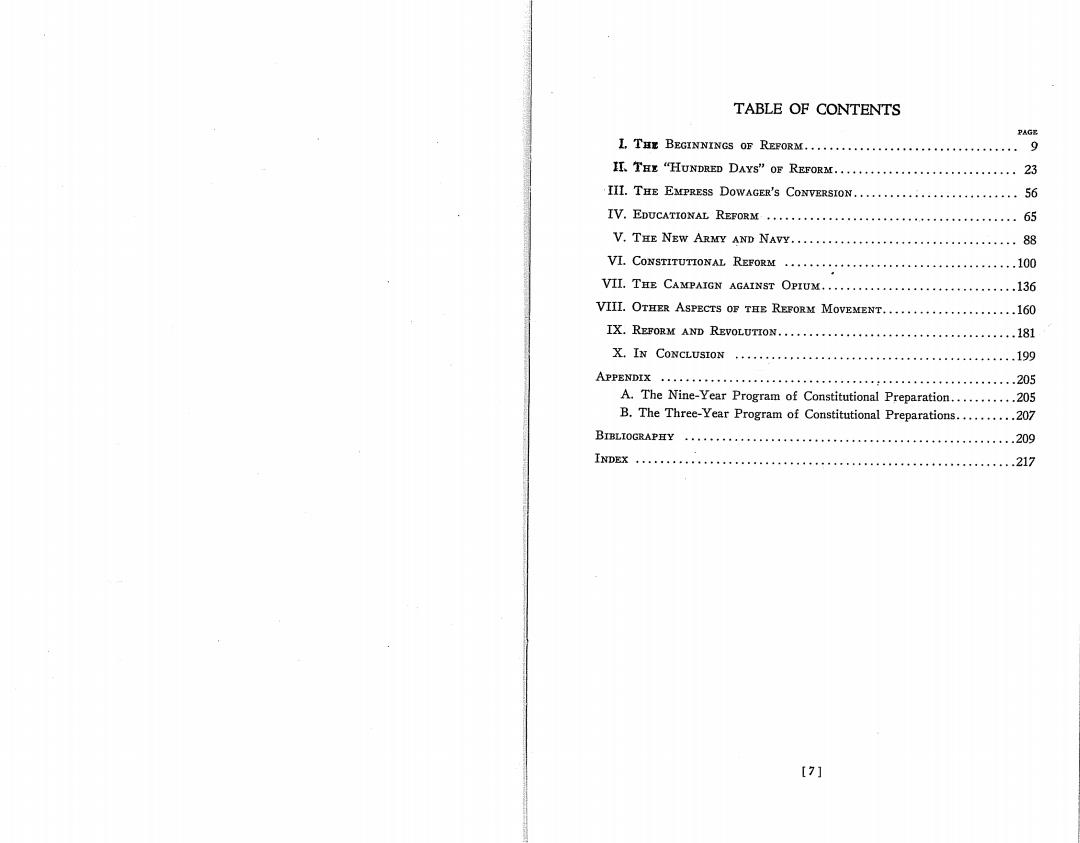
TABLE OF CONTENTS PAGE I Tag BEGINNINGS oF RggoRM................................9 红HE"HUNDRED DAYS'”OF REFOR.,· 23 III.THE EMPRESS DowAGER's CoNvERSION........................... 56 IV.EpUcATroNAL REPoRM..............................65 V.THE NEW ARmg AND NAvY..................................... 88 VI.CoNsrIrUroNAL RgFoRM......................................100 VIL.THE CAMPAIGN AGAINST OprUM.............136 VIIL.OTEER ASPECTs OF THE REFORM MovEMENT......................160 IX.RgFoRM AND RgvoLUrron.......................................181 X.IN ............................................199 APPENDIX.......................................................205 A.The Nine-Year Program of Constitutional Preparation...........205 B.The Three-Year Program of Constitutional Preparations..........207 .......................................................209 INDEx........................................................217 [7]
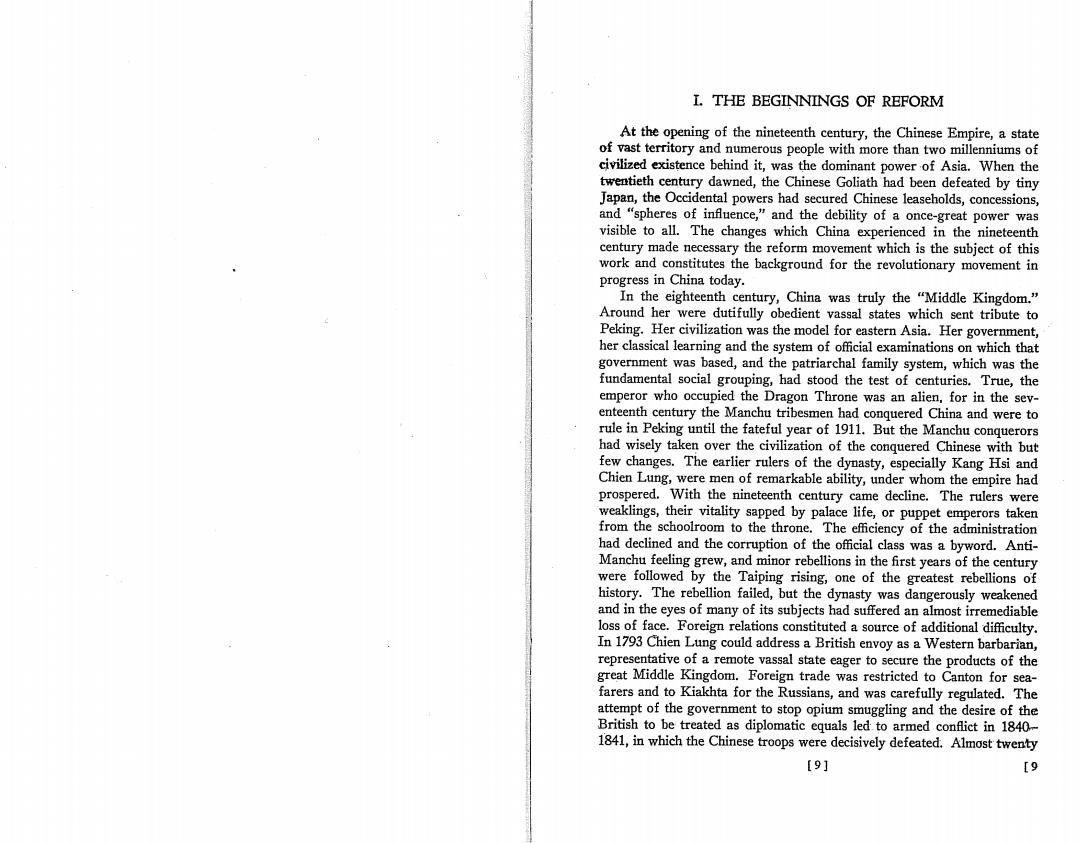
I.THE BEGINNINGS OF REFORM At the opening of the nineteenth century,the Chinese Empire,a state of vast territory and numerous people with more than two millenniums of civilized existence behind it,was the dominant power of Asia.When the twentieth century dawned,the Chinese Goliath had been defeated by tiny Japan,the Occidental powers had secured Chinese leaseholds,concessions, and "spheres of influence,"and the debility of a once-great power was visible to all.The changes which China experienced in the nineteenth century made necessary the reform movement which is the subject of this work and constitutes the background for the revolutionary movement in progress in China today. In the eighteenth century,China was truly the "Middle Kingdom." Around her were dutifully obedient vassal states which sent tribute to Peking.Her civilization was the model for eastern Asia.Her government, her classical learning and the system of official examinations on which that government was based,and the patriarchal family system,which was the fundamental social grouping,had stood the test of centuries.True,the emperor who occupied the Dragon Throne was an alien.for in the sev- enteenth century the Manchu tribesmen had conquered China and were to rule in Peking until the fateful year of 1911.But the Manchu conquerors had wisely taken over the civilization of the conquered Chinese with but few changes.The earlier rulers of the dynasty,especially Kang Hsi and Chien Lung,were men of remarkable ability,under whom the empire had prospered.With the nineteenth century came decline.The rulers were weaklings,their vitality sapped by palace life,or puppet emperors taken from the schoolroom to the throne.The efficiency of the administration had declined and the corruption of the official class was a byword.Anti- Manchu feeling grew,and minor rebellions in the first years of the century were followed by the Taiping rising,one of the greatest rebellions of history.The rebellion failed,but the dynasty was dangerously weakened and in the eyes of many of its subjects had suffered an almost irremediable loss of face.Foreign relations constituted a source of additional difficulty. In 1793 Chien Lung could address a British envoy as a Western barbarian, representative of a remote vassal state eager to secure the products of the great Middle Kingdom.Foreign trade was restricted to Canton for sea- farers and to Kiakhta for the Russians,and was carefully regulated.The attempt of the government to stop opium smuggling and the desire of the British to be treated as diplomatic equals led to armed confict in 1840- 1841,in which the Chinese troops were decisively defeated.Almost twenty [9] [9
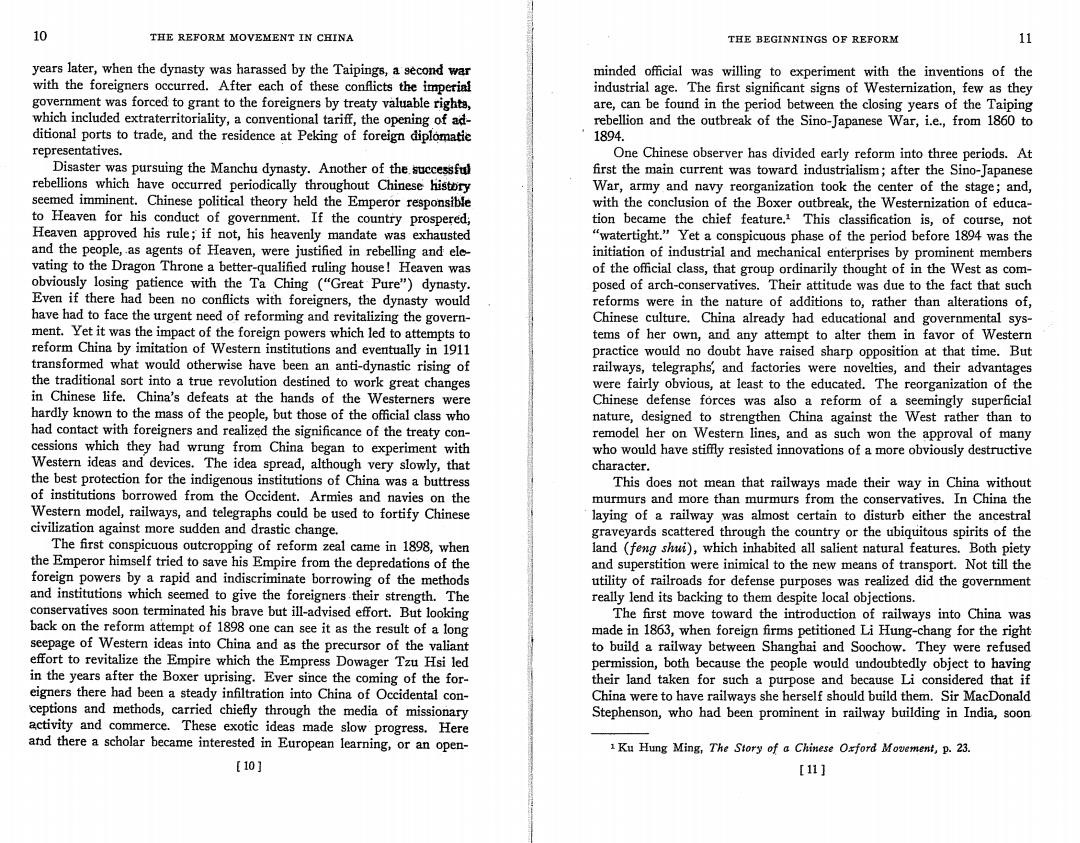
10 THE REFORM MOVEMENT IN CHINA THE BEGINNINGS OF REFORM 11 years later,when the dynasty was harassed by the Taipings,a second war minded official was willing to experiment with the inventions of the with the foreigners occurred.After each of these conflicts the imperial industrial age.The first significant signs of Westernization,few as they government was forced to grant to the foreigners by treaty valuable righta, are,can be found in the period between the closing years of the Taiping which included extraterritoriality,a conventional tariff,the opening of ad- rebellion and the outbreak of the Sino-Japanese War,i.e.,from 1860 to ditional ports to trade,and the residence at Peking of foreign diplomatie 1894. representatives. One Chinese observer has divided early reform into three periods.At Disaster was pursuing the Manchu dynasty.Another of the successful first the main current was toward industrialism;after the Sino-Japanese rebellions which have occurred periodically throughout Chinese history War,army and navy reorganization took the center of the stage;and, seemed imminent.Chinese political theory held the Emperor responsible with the conclusion of the Boxer outbreak,the Westernization of educa- to Heaven for his conduct of government.If the country prospered, tion became the chief feature.This classification is,of course,not Heaven approved his rule;if not,his heavenly mandate was exhausted "watertight."Yet a conspicuous phase of the period before 1894 was the and the people,as agents of Heaven,were justified in rebelling and ele- initiation of industrial and mechanical enterprises by prominent members vating to the Dragon Throne a better-qualified ruling house!Heaven was of the official class,that group ordinarily thought of in the West as com- obviously losing patience with the Ta Ching ("Great Pure")dynasty. posed of arch-conservatives.Their attitude was due to the fact that such Even if there had been no conflicts with foreigners,the dynasty would reforms were in the nature of additions to,rather than alterations of, have had to face the urgent need of reforming and revitalizing the govern- Chinese culture.China already had educational and governmental sys- ment.Yet it was the impact of the foreign powers which led to attempts to tems of her own,and any attempt to alter them in favor of Western reform China by imitation of Western institutions and eventually in 1911 practice would no doubt have raised sharp opposition at that time.But transformed what would otherwise have been an anti-dynastic rising of railways,telegraphs,and factories were novelties,and their advantages the traditional sort into a true revolution destined to work great changes were fairly obvious,at least to the educated.The reorganization of the in Chinese life.China's defeats at the hands of the Westerners were Chinese defense forces was also a reform of a seemingly superficial hardly known to the mass of the people,but those of the official class who nature,designed to strengthen China against the West rather than to had contact with foreigners and realized the significance of the treaty con- remodel her on Western lines,and as such won the approval of many cessions which they had wrung from China began to experiment with who would have stiffly resisted innovations of a more obviously destructive Western ideas and devices.The idea spread,although very slowly,that character. the best protection for the indigenous institutions of China was a buttress This does not mean that railways made their way in China without of institutions borrowed from the Occident.Armies and navies on the murmurs and more than murmurs from the conservatives.In China the Western model,railways,and telegraphs could be used to fortify Chinese laying of a railway was almost certain to disturb either the ancestral civilization against more sudden and drastic change. graveyards scattered through the country or the ubiquitous spirits of the The first conspicuous outcropping of reform zeal came in 1898,when land (fexg shui),which inhabited all salient natural features.Both piety the Emperor himself tried to save his Empire from the depredations of the and superstition were inimical to the new means of transport.Not till the foreign powers by a rapid and indiscriminate borrowing of the methods utility of railroads for defense purposes was realized did the government and institutions which seemed to give the foreigners their strength.The really lend its backing to them despite local objections. conservatives soon terminated his brave but ill-advised effort.But looking The first move toward the introduction of railways into China was back on the reform attempt of 1898 one can see it as the result of a long made in 1863,when foreign firms petitioned Li Hung-chang for the right seepage of Western ideas into China and as the precursor of the valiant to build a railway between Shanghai and Soochow.They were refused effort to revitalize the Empire which the Empress Dowager Tzu Hsi led permission,both because the people would undoubtedly object to having in the years after the Boxer uprising.Ever since the coming of the for- their land taken for such a purpose and because Li considered that if eigners there had been a steady infiltration into China of Occidental con- China were to have railways she herself should build them.Sir MacDonald ceptions and methods,carried chiefly through the media of missionary Stephenson,who had been prominent in railway building in India,soon activity and commerce.These exotic ideas made slow progress.Here anad there a scholar became interested in European learning,or an open- 1Ku Hung Ming,The Story of a Chinese Orford Movement,p.23. 【10] [11]

12 THE REFORM MOVEMENT IN CHINA THE BEGINNINGS OF REFORM 13 after drew up a plan for a comprehensive railway system for China.It chuan,whom we have mentioned above in connection with the Shanghai- was received with appropriate thanks by the imperial government,but Woosung line.In 1883,after the war scare with Russia,he advocated was pigeonholed.At last work was undertaken on a line from Shanghai to the Throne the advisability of a network of railway communications to to Woosung by a British firm in 1876.Regular traffic was opened and facilitate the transportation of troops to any part of China's far-flung all went well till a Chinese flung himself under the wheels of the engine borders.In reporting on this memorial,two liberal viceroys,Li Hung- in the supreme form of appeal to public opinion prevailing in China- chang and Liu Kun-yi,reiterated the arguments employed by Liu Ming- suicide.Popular indignation was then aroused against the railway.Soon chuan,attributing the flourishing growth of America and England to arrangements were made to sell the line to the imperial government, their possession of these bringers of wealth and prosperity.The military which,on completing payment,in October 1877,transported both rails argument was the decisive one,however,and converted no less a person and rolling stock to Formosa.The last sign of this first railway enterprise than the redoubtable conservative and military hero,Tso Tsung-tang, in China was obliterated by the erection of a temple on the site of the who in his valedictory memorial of 1885 advocated the introduction of erstwhile railway station.However,the materials transported to Formosa railways and arsenals as needful means of strengthening the empire.s were put to good use by an enlightened and able governor-general,Liu In 1889 the question of the further extension of the Kaiping line was Ming-chuan,who in the 'eighties built with them a line from the capital put before the Grand Council and the high provincial authorities and led to the coast.? to a number of memorials,the best received being that of the famous In the meantime,railway construction was progressing on the main- scholar and well-beloved official,Chang Chih-tung.The character of this land and had received imperial approval,thanks to the zeal of Li Hung- man,who played an important role in the development of the reform chang,perhaps the best known to Westerners of all Chinese officials.Li movement,presented obvious contradictions.At times he showed a re- had first gained prominence as one of the loyal Chinese generals who did ceptiveness to foreign ideas,at others he returned to dyed-in-the-wool much to stop the threatening progress of the Taipings.He had by the Confucianism.To judge from Chang's famous book,Learn,the pressure 'seventies attained the dignity of viceroy of the metropolitan province, of circumstances finally drove him to advocate Confucian morality for the Chihli.In 1878 he was approached by Tong King-sing,a product of individual but Westernization for the nation.One Western commentator missionary schools in China and the organizer of the China Merchants' has said of him:"a distinguished scholar,famed for the classical style of Steam Navigation Company,one of the most important commercial ven- his state papers,exceeding honest and devoted to the welfare of his people, tures of this period.s Tong wished to develop the Kaiping coalfields in in public life he was a trimmer."The proposal which he put forth in northern Chihli to supply coal for the company's ships and desired a 1889 was typical of the protean schemes which from time to time filled railway connection from the coalfields to Pehtang,where the coal would the head of this "scholarly bungler,"as he was often called.Rejecting have to be shipped.Li supported the scheme and obtained imperial sanc- the idea of further extension of the line in Chihli,he advocated the prompt tion,but because of the superstitious opposition of the populace only a construction of trunk lines and suggested that work be started at once on a horse tramway was at first projected.Later,in 1881,Li secured permis- line from Hankow to Lukouchiao,outside Peking.This ambitious project, sion to operate a bona fide railway.Step by step,the line was extended, beyond the ability of China to carry out unaided at that time,nevertheless first to Lutai,and finally as far as Tientsin by October,1888.By this was received favorably.That it might be advanced more rapidly,Chang time,the opponents of this novel venture had organized and were dominant himself was shifted to the Hukuang viceroyalty,where he would be in at court,and the whole scheme was threatened with failure. charge of the southern terminus of the proposed line.There he showed In the end the railway idea was bound to triumph,and it had already his zeal by erecting factories to turn out rails and by employing foreign won.over many of the most noted mandarins of the time.One of the first engineers.During his administration,Hankow also became the seat of a to memorialize in favor of railway development for China was Liu Ming- modern cotton mill,the first of its sort in China.It had previously been in operation in Canton,but when Chang was transferred to Wuchang the Kent,Railway Enterprise in China,pp.1-21. Morse,The International Relations of the Chinese Empire,hereafter referred to Wilson,China,Travels and Investigations in the "Middle Kingdom,"pp.119- as International Relations,II,315-316. 149. +Kent,op.cit.,chapters iv,v. Morse,International Relations,III,361-362. [12] [13]
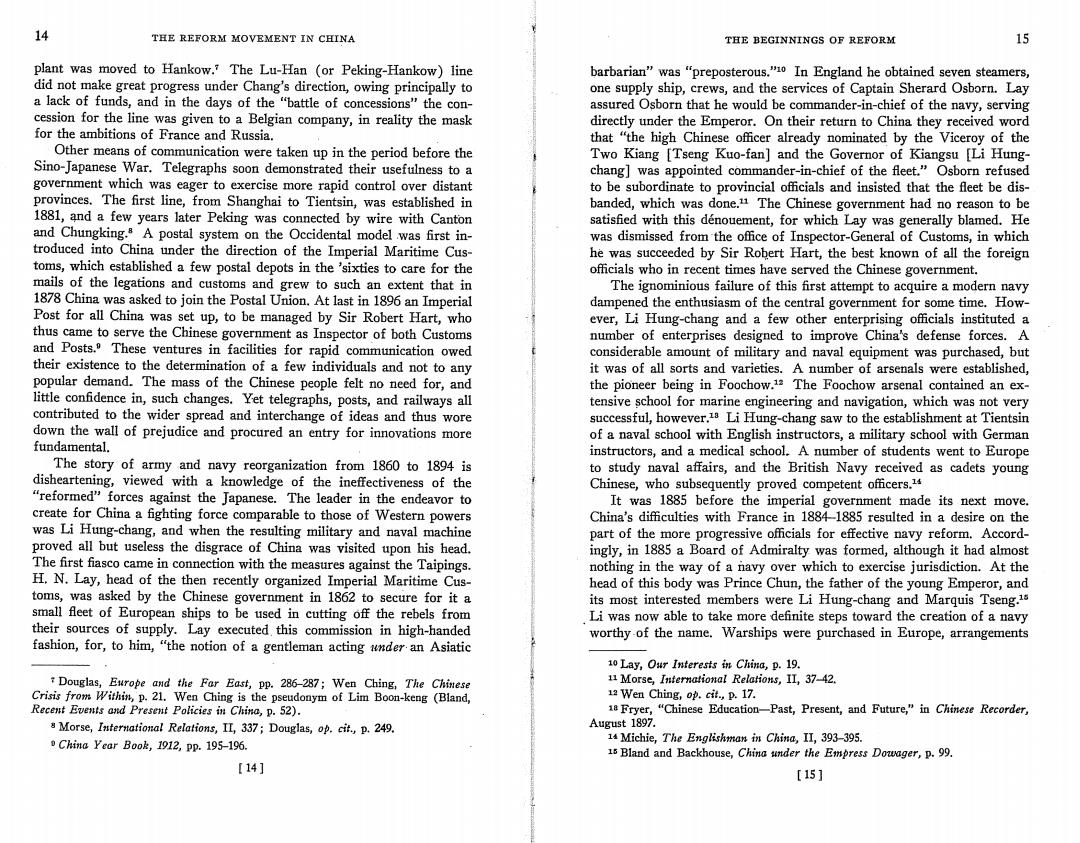
14 THE REFORM MOVEMENT IN CHINA THE BEGINNINGS OF REFORM 15 plant was moved to Hankow.'The Lu-Han (or Peking-Hankow)line barbarian"was "preposterous."10 In England he obtained seven steamers, did not make great progress under Chang's direction,owing principally to one supply ship,crews,and the services of Captain Sherard Osborn.Lay a lack of funds,and in the days of the "battle of concessions"the con- assured Osborn that he would be commander-in-chief of the navy,serving cession for the line was given to a Belgian company,in reality the mask directly under the Emperor.On their return to China they received word for the ambitions of France and Russia. that "the high Chinese officer already nominated by the Viceroy of the Other means of communication were taken up in the period before the Two Kiang [Tseng Kuo-fan]and the Governor of Kiangsu [Li Hung- Sino-Japanese War.Telegraphs soon demonstrated their usefulness to a chang]was appointed commander-in-chief of the fleet."Osborn refused government which was eager to exercise more rapid control over distant to be subordinate to provincial officials and insisted that the fleet be dis- provinces.The first line,from Shanghai to Tientsin,was established in banded,which was done.1 The Chinese government had no reason to be 1881,and a few years later Peking was connected by wire with Canton satisfied with this denouement,for which Lay was generally blamed.He and Chungking.A postal system on the Occidental model was first in- was dismissed from the office of Inspector-General of Customs,in which troduced into China under the direction of the Imperial Maritime Cus- he was succeeded by Sir Robert Hart,the best known of all the foreign toms,which established a few postal depots in the 'sixties to care for the officials who in recent times have served the Chinese government. mails of the legations and customs and grew to such an extent that in The ignominious failure of this first attempt to acquire a modern navy 1878 China was asked to join the Postal Union.At last in 1896 an Imperial dampened the enthusiasm of the central government for some time.How- Post for all China was set up,to be managed by Sir Robert Hart,who ever,Li Hung-chang and a few other enterprising officials instituted a thus came to serve the Chinese government as Inspector of both Customs number of enterprises designed to improve China's defense forces.A and Posts.These ventures in facilities for rapid communication owed considerable amount of military and naval equipment was purchased,but their existence to the determination of a few individuals and not to any it was of all sorts and varieties.A number of arsenals were established, popular demand.The mass of the Chinese people felt no need for,and the pioneer being in Foochow.12 The Foochow arsenal contained an ex- little confidence in,such changes.Yet telegraphs,posts,and railways all tensive school for marine engineering and navigation,which was not very contributed to the wider spread and interchange of ideas and thus wore successful,however.18 Li Hung-chang saw to the establishment at Tientsin down the wall of prejudice and procured an entry for innovations more of a naval school with English instructors,a military school with German fundamental. instructors,and a medical school.A number of students went to Europe The story of army and navy reorganization from 1860 to 1894 is to study naval affairs,and the British Navy received as cadets young disheartening,viewed with a knowledge of the ineffectiveness of the Chinese,who subsequently proved competent officers.14 "reformed"forces against the Japanese.The leader in the endeavor to It was 1885 before the imperial government made its next move. create for China a fighting force comparable to those of Western powers China's difficulties with France in 1884-1885 resulted in a desire on the was Li Hung-chang,and when the resulting military and naval machine part of the more progressive officials for effective navy reform.Accord- proved all but useless the disgrace of China was visited upon his head. ingly,in 1885 a Board of Admiralty was formed,although it had almost The first fiasco came in connection with the measures against the Taipings. nothing in the way of a navy over which to exercise jurisdiction.At the H.N.Lay,head of the then recently organized Imperial Maritime Cus- head of this body was Prince Chun,the father of the young Emperor,and toms,was asked by the Chinese government in 1862 to secure for it a its most interested members were Li Hung-chang and Marquis Tseng.15 small feet of European ships to be used in cutting off the rebels from Li was now able to take more definite steps toward the creation of a navy their sources of supply.Lay executed.this commission in high-handed worthy of the name.Warships were purchased in Europe,arrangements fashion,for,to him,"the notion of a gentleman acting under an Asiatic 10 Lay,Our Interests in China,p.19. Douglas,Europe and the Far East,pp.286-287;Wen Ching,The Chinese Morse,International Relations,II,37-42. Crisis from Within,p.21.Wen Ching is the pseudonym of Lim Boon-keng (Bland, 1a Wen Ching,op.cit.,D.17. Recent Events and Present Policies in China,p.52). 18 Fryer,"Chinese Education-Past,Present,and Future,"in Chinese Recorder, Morse,International Relations,IL,337;Douglas,op.cit,p.249. August 1897. China Year Book,1912,pp.195-196. 14 Michie,The Englishman in China,II,393-395. 15 Bland and Backhouse,China under the Empress Dowager,p.99. [14] [15]

16 THE REFORM MOVEMENT IN CHINA THE BEGINNINGS OF REFORM 17 were made for foreign instructors,and further dock and harbor works attained modern organization was a corps under the direction of Li were built.In all,the navy consisted of two ironclads,a considerable Hung-chang,as viceroy of Chihli.This force,comprising some 50,000 number of cruisers,and sundry other craft.10 It was divided into two men and drilled by German officers,was the only thing of its kind in sections,the Nanyang,or Southern Squadron,directed by Captain Tracy, China.30 For the most part,the army remained a sort of feudal levy, with headquarters at Foochow,and the Peiyang,or Northern Squadron, which was totally unable to cope with the well-disciplined Japanese.Li under Captain Lang,in the Gulf of Pechihli.The latter officer proved had done his best to procure an adequate system of defenses but had particularly successful in organizing and directing his squadron.Had he failed,and the net result for China was a crushing defeat at great cost, been with the Chinese navy in the struggle with Japan,it might have come not only in money but in the prestige which had helped to shield her from through more creditably.Unfortunately he found it necessary in 1890 to the predatory instincts of the foreign powers.21 resign.Intrigue and jealousy among the Chinese officers made it impos- The changes in education.which appeared at this time were more truly sible for him to keep on.The trouble had its source in provincial loyalty, the beginnings of a new China than any number of factories or modern for most of the officers were Foochow men and the Chinese admiral was army corps.In the old China,the scholar ruled.The officials of the not.17 Lang's experience was an indication of one of the evils which empire were chosen from the successful candidates in the great series of weakened the navy-family,local,or provincial feeling.The navy pos- examinations based on the traditional Confucian literature.Not until after sessed no esprit de corps,a fact which was lamentably illustrated.in the the Boxer rising did classical learning as the way to government office battle of the Yalu.Many of the officers and men had courage and good give way to an educational system on the Occidental model.During the training,but "there was no tradition to render them fruitful,no martial nineteenth century,however,knowledge of the science and literature of spirit,no disgrace for the coward,no honour for the valiant."In the the West was being spread by the Christian missionaries.It has been China of that day,the defense forces did not enjoy much respect.The declared that the efforts of the missionaries in propagating foreign science army or navy afforded no career for a promising youth;instead he was and philosophy were largely abortive,since their converts were of the almost certain to set foot on the ladder of examinations which led to the lower classes,who had nothing to lose by a change of faith,and their civil service.It was not till after the Boxer Rebellion,when a spirit of activities gained opposition from the official classes and the greater part nationalism began to spread in China,that the army and navy acquired of the population,as the long tale of anti-foreign outbreaks evidenced.2 anything like the prestige and morale which such bodies possessed in the To subscribe without reservation to this view would be to overlook the Occident. important connection which existed between the Christian teachers and The defects in China's naval forces,which were apparent even before many of the pioneers of reform in China.The picture of Western culture the test of battle,were due in part to two events which occurred in 1889. which the missionaries presented may have been warped and distorted In that year Marquis Tseng died,and the navy lost one of its greatest in some features,but that does not alter the fact that for Chinese who were helpers in Peking.And it was also in 1889 that the Emperor decreed the eager to learn about the West the missionary schools and publications reconstruction of the Summer Palace,destroyed by the foreigners in 1860. offered the easiest means of access to that knowledge. Between this decision and the condition of the navy,there was a connec- The Protestant missionaries began their educational work early in the tion of a most unfortunate sort.The chief difficulty in the reconstruction nineteenth century.At Canton in 1833 a printing-press was established of the palace was a lack of funds.As a solution of the difficulty,Li with S.Wells Williams in charge,and a similar enterprise was soon Lien-ying,the chief eunuch,who had great influence with the Empress opened in Shanghai.2 In 1839 the Morrison Society School was opened Dowager,proposed that her projected residence be built with the naval in Canton in memory of the famous missionary,Dr.Robert Morrison, appropriations,a suggestion which was acted upon.19 and among its most notable students were Yung Wing and Tong King- On army reform,less was done.The only part of the army which ever sing.Other early missionary institutions were Tengchow College,St. 16 Michie,op.cit.,II,398. 17 Ibid.,II,400;Douglas,op.cit.,p.288;King,In the Chinese Customs Service, 20 Boulger,A Short History of China,p.370. p.89. 21 Michie,og.cit.,II,401-402. 2 Wen Ching,op.cit.,pp.13-15. i8 Michie,op.cit.,II,412. 2 Martin,The Awakening of China,p.283. 10 Bland and Backhouse,op.cit.,p.99. 24 Fryer,"Chinese Education-Past,Present,and Future,"in Chinese Recorder, 行August1897. [16] [17]
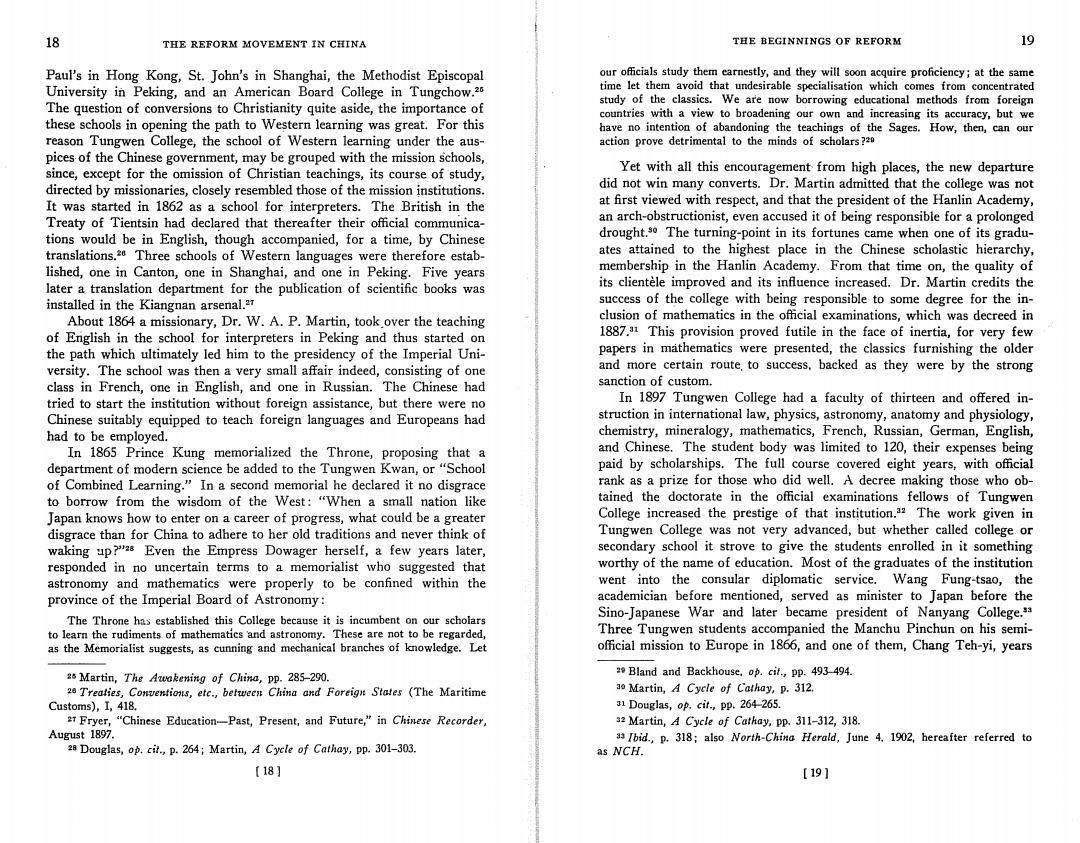
18 THE REFORM MOVEMENT IN CHINA THE BEGINNINGS OF REFORM 19 Paul's in Hong Kong,St.John's in Shanghai,the Methodist Episcopal our officials study them earnestly,and they will soon acquire proficiency;at the same University in Peking,and an American Board College in Tungchow.20 time let them avoid that undesirable specialisation which comes from concentrated The question of conversions to Christianity quite aside,the importance of study of the classics.We are now borrowing educational methods from foreign countries with a view to broadening our own and increasing its accuracy,but we these schools in opening the path to Western learning was great.For this have no intention of abandoning the teachings of the Sages.How,then,can our reason Tungwen College,the school of Western learning under the aus- action prove detrimental to the minds of scholars?20 pices of the Chinese government,may be grouped with the mission schools, since,except for the omission of Christian teachings,its course of study, Yet with all this encouragement from high places,the new departure directed by missionaries,closely resembled those of the mission institutions. did not win many converts.Dr.Martin admitted that the college was not It was started in 1862 as a school for interpreters.The British in the at first viewed with respect,and that the president of the Hanlin Academy, Treaty of Tientsin had declared that thereafter their official communica- an arch-obstructionist,even accused it of being responsible for a prolonged tions would be in English,though accompanied,for a time,by Chinese drought.so The turning-point in its fortunes came when one of its gradu- translations.20 Three schools of Western languages were therefore estab- ates attained to the highest place in the Chinese scholastic hierarchy, lished,one in Canton,one in Shanghai,and one in Peking.Five years membership in the Hanlin Academy.From that time on,the quality of later a translation department for the publication of scientific books was its clientele improved and its influence increased.Dr.Martin credits the installed in the Kiangnan arsenal." success of the college with being responsible to some degree for the in- About 1864 a missionary,Dr.W.A.P.Martin,took over the teaching clusion of mathematics in the official examinations,which was decreed in of English in the school for interpreters in Peking and thus started on 1887.1 This provision proved futile in the face of inertia,for very few the path which ultimately led him to the presidency of the Imperial Uni- papers in mathematics were presented,the classics furnishing the older versity.The school was then a very small affair indeed,consisting of one and more certain route.to success.backed as they were by the strong class in French,one in English,and one in Russian.The Chinese had sanction of custom. tried to start the institution without foreign assistance,but there were no In 1897 Tungwen College had a faculty of thirteen and offered in- Chinese suitably equipped to teach foreign languages and Europeans had struction in international law,physics,astronomy,anatomy and physiology, had to be employed. chemistry,mineralogy,mathematics,French,Russian,German,English, In 1865 Prince Kung memorialized the Throne,proposing that a and Chinese.The student body was limited to 120,their expenses being department of modern science be added to the Tungwen Kwan,or "School paid by scholarships.The full course covered eight years,with official of Combined Learning."In a second memorial he declared it no disgrace rank as a prize for those who did well.A decree making those who ob- to borrow from the wisdom of the West:"When a small nation like tained the doctorate in the official examinations fellows of Tungwen Japan knows how to enter on a career of progress,what could be a greater College increased the prestige of that institution.2 The work given in disgrace than for China to adhere to her old traditions and never think of Tungwen College was not very advanced,but whether called college or waking up?2s Even the Empress Dowager herself,a few years later, secondary school it strove to give the students enrolled in it something responded in no uncertain terms to a memorialist who suggested that worthy of the name of education.Most of the graduates of the institution astronomy and mathematics were properly to be confined within the went into the consular diplomatic service.Wang Fung-tsao,the province of the Imperial Board of Astronomy: academician before mentioned,served as minister to Japan before the The Throne has established this College because it is incumbent on our scholars Sino-Japanese War and later became president of Nanyang College." to learn the rudiments of mathematics and astronomy.These are not to be regarded, Three Tungwen students accompanied the Manchu Pinchun on his semi- as the Memorialist suggests,as cunning and mechanical branches of knowledge.Let official mission to Europe in 1866,and one of them,Chang Teh-yi,years as Martin,The Awakening of China,pp.285-290. Bland and Backhouse.op.cit.,pp.493-494. 2 Treaties,Conventions,etc.,between China and Foreign States (The Maritime 30 Martin,A Cycle of Cathay,p.312. Customs),I,418. 1 Douglas,op.cit.,pp.264-265. Fryer,"Chinese Education-Past,Present,and Future,"in Chinese Recorder, 32 Martin,A Cycle of Cathay,pp.311-312,318. August 1897. aa Ibid.,p.318;also North-China Herald,June 4.1902,hereafter referred to 28 Douglas,op.cit.,p.264;Martin,A Cycle of Cathay,pp.301-303. as NCH. 【18] [191